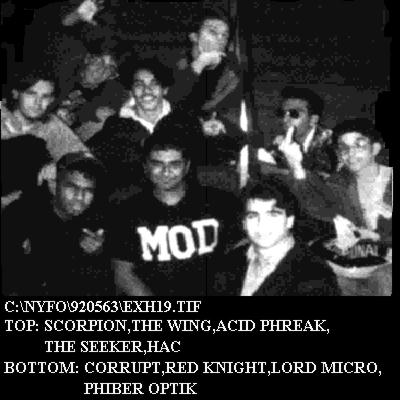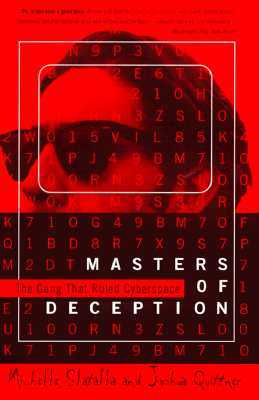Hacker Dossier: Phiber Optik
“The main difference between hackers is not the level of their knowledge, but the level of their mental imbalance. Take away the modems from them, give them skateboards, and you won’t even see much change. ”
Said John Perry Barlow , freelance journalist and songwriter for the Grateful Dead, in 1990.
After 13 minutes, someone Phiber Optik posted Barlow's credit history and screenshots of his desktop. [ source ]

Mark Aben (born in 1972) is an information security specialist from New York. Best known by his pseudonym Phiber Optik, he was a member of the hacker groups “Legion of Doom” and “Masters of Deception”.
Phiber Optik was an outstanding hacker in the 1980s and early 90s, the New York Times, Harper's, Esquire wrote about him, and he participated in television debates. He is also an important character in the 1995 documentary Masters of Deception - The Gang that Ruled Cyberspace
 Mark Aben's first contact with computers occurred at the age of 9 at a local department store, where he often spent time while his parents went shopping. His first computer was a TRS-80 MC-10 with 4 kilobytes of RAM, a text screen (32 * 16 8 colors), a cassette recorder connector for downloading and saving programs. As was usual in those days, the computer connected to the TV, which was used as a monitor. After his parents gave him more RAM (improved to 20 kilobytes) and a 300-baud modem, he used his computer to access Compuserve and, thanks to new acquaintances on their chat “ CB Simulator ”, the first national chat, soon discovered the world Bbs .
Mark Aben's first contact with computers occurred at the age of 9 at a local department store, where he often spent time while his parents went shopping. His first computer was a TRS-80 MC-10 with 4 kilobytes of RAM, a text screen (32 * 16 8 colors), a cassette recorder connector for downloading and saving programs. As was usual in those days, the computer connected to the TV, which was used as a monitor. After his parents gave him more RAM (improved to 20 kilobytes) and a 300-baud modem, he used his computer to access Compuserve and, thanks to new acquaintances on their chat “ CB Simulator ”, the first national chat, soon discovered the world Bbs .
On several BBSs, Aben discovered dial-up access and guest accounts for DEC minicomputers running on their own RSTS / E and TOPS-10 operating systemsserving the School Resource Optimization Program (BOCES) in Long Island, NY. Having gained access to those DOC minicomputers, he realized that there was a programming space far beyond the capabilities of his home computer, and he began to borrow books in the library in order to learn the programming languages that were open to him. This ability to remotely save and download programs that will still be there during his next entrance made a deep impression on Aben, who began to perceive his rather modest computer as a window into a much larger world.

Having learned enough about programming and the basics of security in those early years, Aben further honed his skills in comprehending the mazes of the national telephone network.
In the mid-80s, it was first introduced to members of the Legion of Doom (LOD) , a poorly organized group of trustworthy teenage hackers who shared Aben's uncompromising desire to understand electronics. The focus of their attention was the study of telecommunication systems, minicomputers, mainframe operating systems and networks for the transfer of large amounts of data. The final collapse of LOD by the end of the 80s, largely due to fragmentation and internal altercations and the accompanying prosecution of some of its members, brought Aben to a local group of energetic hackers who called themselvesMasters of Deception (MOD) .

On January 24, 1990, the US Secret Service searched the apartments of MOD group members with confiscation of property in connection with suspicions of authorities in their involvement in the collapse of the AT&T corporation network, which occurred a week earlier on January 15. A few weeks later, AT&T acknowledged that the cause of the crash was an error updating the software on their remote networks and the human factor on their part.
In February 1991, Aben was arrested and charged with malicious interference with first-degree computing in accordance with the laws of the State of New York. For the legislation of those days, information security was a rather vague area. Aben, being a minor at that time, was found not guilty on most points, and, agreeing at the end to a minor offense, was sentenced to 35 hours of community service.
Aben and four other MOD members were also arrested in December 1991, and the Manhattan Federal Jury on July 8, 1992 proposed that they be sentenced to 11 years in prison. The official charge relied on telephone recordings of members of the group. According to Attorney Otto Obermeyer, “this was the first time that a court-approved interception of telephone conversations and the exchange of hacker data in the United States was used.”
As reported on July 9, 1992, the Electronic Frontier Foundationthe defendants were facing 50 years in prison and a $ 2.5 million fine if convicted on all counts. Despite the fact that Aben was a minor when crimes were committed, and he accounted for only a small part of the charges, the court decision was harsh: 12 months in prison, three years of probation and 600 hours of community service.

After serving his sentence in the Federal Camp “Prison” in Pennsylvania, Aben was released in November 1994. In January 1995, he celebrated this with a noisy party, the so-called "Phiberphest '95" at the Manhattan nightclub Irving Plaza. In Time, Joshua Kittner called him "the first hero of the underground of the Information Age, Robin Hood of cyberspace."
Many from the hacker world and outside it considered that Aben was unjustly condemned as a warning to the rest.
Aben has built up a significant reputation in the hacker subculture, for example, regularly appearing on the “Off the hook” radio program by Eric Corley (the so-called Emanuel Goldstein), participating in debates and defending the moral and motivation of hackers in public forums and interviews, giving lectures on history telecommunication technology at night courses at a number of New York universities. At the time of the charge, he worked for MindVox (an early BBS / ISP organized by two LOD members) and subsequently for EchoNYC, a multi-player BBS and early ISP.
ECHO users and hackers throughout the country expected Aben to be released from probation or at least several months in prison. Other defendants in the same case received a milder sentence. And given Aben’s desire to use his hacking skills for constructive purposes, the general feeling was that he was unjustly condemned.
The statement made by the public prosecutor Otto Obermeyer regarding the sentence: “This sentence - a message that such behavior will not be lenient, regardless of age or declared goals” - was perceived by Aben supporters as a demonstration of the authorities' response to the notorious “hacker threat”. In passing the verdict, Judge Stanton said: “today's charge is a symbol” and “hacker crimes pose a real threat to the growing information highway.” This only strengthened the general opinion that the harmless “teacher” was convicted only for the label “hacker”.
Aben spoke on security in many media outlets, including in The New York Times, Washington Post, Wall Street Journal, Time Magazine. He has been a speaker at security and hacking conferences around the world, and often lectures to students on information security.
After years of working as a security consultant, he teamed up with former LoD member Dave Bushwald and his third colleague Andrei Brown to create the Crossbar Security consulting company. The company provided services to companies doing business in the USA, Japan, Brazil and Sweden. After the dot-com collapse, Crossbar ceased to exist, largely due to corporate cuts in security costs.
Aben's acting debut took place in 2006 in the sci-fi movie “ Urchin”, Which also starred other famous hackers Dave Bushwald and Emmanuel Goldstein.
In 2009, he founded TraceVector, an intrusion detection system company that uses supercomputers to analyze data. Currently, a resident of Silicon Valley.

Masters of Deception - The Gang that Ruled Cyberspace
Publication Support - Edison , a company that develops an Electronic Transmission Service for Prisoners and has implemented a viral distribution of information .
Said John Perry Barlow , freelance journalist and songwriter for the Grateful Dead, in 1990.
After 13 minutes, someone Phiber Optik posted Barlow's credit history and screenshots of his desktop. [ source ]

Mark Aben (born in 1972) is an information security specialist from New York. Best known by his pseudonym Phiber Optik, he was a member of the hacker groups “Legion of Doom” and “Masters of Deception”.
Phiber Optik was an outstanding hacker in the 1980s and early 90s, the New York Times, Harper's, Esquire wrote about him, and he participated in television debates. He is also an important character in the 1995 documentary Masters of Deception - The Gang that Ruled Cyberspace
early years
 Mark Aben's first contact with computers occurred at the age of 9 at a local department store, where he often spent time while his parents went shopping. His first computer was a TRS-80 MC-10 with 4 kilobytes of RAM, a text screen (32 * 16 8 colors), a cassette recorder connector for downloading and saving programs. As was usual in those days, the computer connected to the TV, which was used as a monitor. After his parents gave him more RAM (improved to 20 kilobytes) and a 300-baud modem, he used his computer to access Compuserve and, thanks to new acquaintances on their chat “ CB Simulator ”, the first national chat, soon discovered the world Bbs .
Mark Aben's first contact with computers occurred at the age of 9 at a local department store, where he often spent time while his parents went shopping. His first computer was a TRS-80 MC-10 with 4 kilobytes of RAM, a text screen (32 * 16 8 colors), a cassette recorder connector for downloading and saving programs. As was usual in those days, the computer connected to the TV, which was used as a monitor. After his parents gave him more RAM (improved to 20 kilobytes) and a 300-baud modem, he used his computer to access Compuserve and, thanks to new acquaintances on their chat “ CB Simulator ”, the first national chat, soon discovered the world Bbs .On several BBSs, Aben discovered dial-up access and guest accounts for DEC minicomputers running on their own RSTS / E and TOPS-10 operating systemsserving the School Resource Optimization Program (BOCES) in Long Island, NY. Having gained access to those DOC minicomputers, he realized that there was a programming space far beyond the capabilities of his home computer, and he began to borrow books in the library in order to learn the programming languages that were open to him. This ability to remotely save and download programs that will still be there during his next entrance made a deep impression on Aben, who began to perceive his rather modest computer as a window into a much larger world.

Having learned enough about programming and the basics of security in those early years, Aben further honed his skills in comprehending the mazes of the national telephone network.
In the mid-80s, it was first introduced to members of the Legion of Doom (LOD) , a poorly organized group of trustworthy teenage hackers who shared Aben's uncompromising desire to understand electronics. The focus of their attention was the study of telecommunication systems, minicomputers, mainframe operating systems and networks for the transfer of large amounts of data. The final collapse of LOD by the end of the 80s, largely due to fragmentation and internal altercations and the accompanying prosecution of some of its members, brought Aben to a local group of energetic hackers who called themselvesMasters of Deception (MOD) .

Difficulties with the law
On January 24, 1990, the US Secret Service searched the apartments of MOD group members with confiscation of property in connection with suspicions of authorities in their involvement in the collapse of the AT&T corporation network, which occurred a week earlier on January 15. A few weeks later, AT&T acknowledged that the cause of the crash was an error updating the software on their remote networks and the human factor on their part.
In February 1991, Aben was arrested and charged with malicious interference with first-degree computing in accordance with the laws of the State of New York. For the legislation of those days, information security was a rather vague area. Aben, being a minor at that time, was found not guilty on most points, and, agreeing at the end to a minor offense, was sentenced to 35 hours of community service.
Aben and four other MOD members were also arrested in December 1991, and the Manhattan Federal Jury on July 8, 1992 proposed that they be sentenced to 11 years in prison. The official charge relied on telephone recordings of members of the group. According to Attorney Otto Obermeyer, “this was the first time that a court-approved interception of telephone conversations and the exchange of hacker data in the United States was used.”
As reported on July 9, 1992, the Electronic Frontier Foundationthe defendants were facing 50 years in prison and a $ 2.5 million fine if convicted on all counts. Despite the fact that Aben was a minor when crimes were committed, and he accounted for only a small part of the charges, the court decision was harsh: 12 months in prison, three years of probation and 600 hours of community service.

After serving his sentence in the Federal Camp “Prison” in Pennsylvania, Aben was released in November 1994. In January 1995, he celebrated this with a noisy party, the so-called "Phiberphest '95" at the Manhattan nightclub Irving Plaza. In Time, Joshua Kittner called him "the first hero of the underground of the Information Age, Robin Hood of cyberspace."
Public protests
Many from the hacker world and outside it considered that Aben was unjustly condemned as a warning to the rest.
Aben has built up a significant reputation in the hacker subculture, for example, regularly appearing on the “Off the hook” radio program by Eric Corley (the so-called Emanuel Goldstein), participating in debates and defending the moral and motivation of hackers in public forums and interviews, giving lectures on history telecommunication technology at night courses at a number of New York universities. At the time of the charge, he worked for MindVox (an early BBS / ISP organized by two LOD members) and subsequently for EchoNYC, a multi-player BBS and early ISP.
ECHO users and hackers throughout the country expected Aben to be released from probation or at least several months in prison. Other defendants in the same case received a milder sentence. And given Aben’s desire to use his hacking skills for constructive purposes, the general feeling was that he was unjustly condemned.
The statement made by the public prosecutor Otto Obermeyer regarding the sentence: “This sentence - a message that such behavior will not be lenient, regardless of age or declared goals” - was perceived by Aben supporters as a demonstration of the authorities' response to the notorious “hacker threat”. In passing the verdict, Judge Stanton said: “today's charge is a symbol” and “hacker crimes pose a real threat to the growing information highway.” This only strengthened the general opinion that the harmless “teacher” was convicted only for the label “hacker”.
Personal life
Aben spoke on security in many media outlets, including in The New York Times, Washington Post, Wall Street Journal, Time Magazine. He has been a speaker at security and hacking conferences around the world, and often lectures to students on information security.
After years of working as a security consultant, he teamed up with former LoD member Dave Bushwald and his third colleague Andrei Brown to create the Crossbar Security consulting company. The company provided services to companies doing business in the USA, Japan, Brazil and Sweden. After the dot-com collapse, Crossbar ceased to exist, largely due to corporate cuts in security costs.
Aben's acting debut took place in 2006 in the sci-fi movie “ Urchin”, Which also starred other famous hackers Dave Bushwald and Emmanuel Goldstein.
In 2009, he founded TraceVector, an intrusion detection system company that uses supercomputers to analyze data. Currently, a resident of Silicon Valley.
Materials

Masters of Deception - The Gang that Ruled Cyberspace
Publication Support - Edison , a company that develops an Electronic Transmission Service for Prisoners and has implemented a viral distribution of information .
